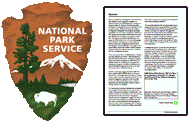United States National Park Service

United States National Park Service: Publications
Date of this Version
2-20-2020
Citation
2020 Elsevier Ltd. All rights reserved.
Abstract
Nurse tree canopies mitigate exposure to freezing temperatures that could result in injury or mortality to the saguaro cactus (Carnegiea gigantea). Abiotic objects have been hypothesized to provide similar beneficial microclimates. We used data loggers at 11 nurse rock sites to record daily daytime summer maximum and winter nighttime minimum temperatures at Saguaro National Park, Arizona, to examine the effectiveness of rocks to moderate seasonal temperature extremes in the microclimate. Temperatures at rock sites averaged 2 °C warmer than exposed open control sites in winter. We found that the efficiency of rocks to act as insulators significantly increased as temperature at control sites decreased, consistent with studies of tree canopies, and that the insulation effect lasted throughout the night. In summer, rocks reduced exposure to maximum temperatures but did not offer significantly more cooling at higher temperatures. Our results suggest that the protection from freezing temperature offered by rocks in winter is more ecologically beneficial to the saguaro than extreme temperature amelioration during summer in the cold-limited frontiers of the species’ range.
Included in
Environmental Education Commons, Environmental Policy Commons, Environmental Studies Commons, Fire Science and Firefighting Commons, Leisure Studies Commons, Natural Resource Economics Commons, Natural Resources Management and Policy Commons, Nature and Society Relations Commons, Other Environmental Sciences Commons, Physical and Environmental Geography Commons, Public Administration Commons, Recreation, Parks and Tourism Administration Commons


Comments
"US govt"